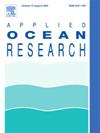Nonlinear modeling of the 3-D ocean sound speed field via incremental sample convolutional exchange network
IF 4.3
2区 工程技术
Q1 ENGINEERING, OCEAN
引用次数: 0
Abstract
The accurate construction of the underwater sound speed fields (SSFs) is critical for systems of positioning, navigation, timing, and communication (PNTC). Currently, the 3-D ocean currents observation is limited by insufficient flow field data and technical constraints, resulting in significant sound speed errors that adversely affect underwater positioning accuracy. To address the challenge of achieving continuous spatiotemporal observations within marine areas, we propose an incremental sample convolutional exchange network (ISCEN) to construct localized 3-D ocean SSFs. Through split and interactive learning, the model iteratively extracts and exchanges ocean acoustic environmental parameters across multiple temporal resolutions. Therefore, it can learn enhanced features of the SSFs and predicting future sound speed distributions. Note that the limitations of computational power and prolonged training times associated with traditional offline learning, we introduce an improved incremental learning method. This approach leverages prior information to achieve intelligent and high-precision construction of SSFs. Experimental results indicate that the model can accurately reconstruct sound speed profiles (SSPs) within the 0 m to 2000 m depth range in selected regions of the South China Sea and the Western Pacific on CORTA 1.0-WNP dataset. The proposed method can flexibly provide real-time sound speed distributions tailored to the varying needs across different areas.
求助全文
约1分钟内获得全文
求助全文
来源期刊

Applied Ocean Research
地学-工程:大洋
CiteScore
8.70
自引率
7.00%
发文量
316
审稿时长
59 days
期刊介绍:
The aim of Applied Ocean Research is to encourage the submission of papers that advance the state of knowledge in a range of topics relevant to ocean engineering.
 求助内容:
求助内容: 应助结果提醒方式:
应助结果提醒方式:


